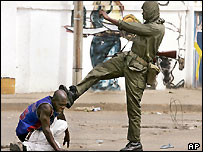 This AP photo illustrates the RPT-style democracy in Togo of the last 38 years. Agbessi, over at Au Village has a first hand account of what it was like to be at the receiving end of the soldier’s boots.
This AP photo illustrates the RPT-style democracy in Togo of the last 38 years. Agbessi, over at Au Village has a first hand account of what it was like to be at the receiving end of the soldier’s boots.
What this picture does not show clearly is that the two men are most likely from different ethnic groups in Togo. But whether they are Kabyé or Ewe, they are both getting screwed by the RPT regime – and they both lost the last election.
One very important aspect of the turmoil in Togo is always carefully avoided by the press: the ethnic dimension. Most of the security forces are Kabyé, but in most of the country outside of Kara the Kabyé life in small enclaves. Historically they are farm workers and sharecroppers; They lived and worked on land others owned. Often they were treated miserably, sometimes they were brutalized by the people around them. Under Eyadema, they were recruited into the armed forces and police. Some became the regime’s henchmen. Now they are scared that they will be killed and brutalized if the RPT loses its grip on power, so they are willing and capable of just about anything to keep the RPT in power.
Yet, there always was discontent and grumbling among the rank-an-file and among the Kabyé not directly related to the Gnassingbé clan. When I was in Togo, over ten years ago, I spoke with Kabyé and with soldiers who were tired of Eyadema and his clan. The soldiers were never paid well. The Kabyé outside Pia (Eyadema’s hometown) saw very little benefit from the RPT regime.
The opposition needs to reach out these folks and gain their trust. Pronouncing Akitani president won’t defeat the RPT. The opposition needs to write “Peace” on their banners, not “War” to try to make it credible to their compatriots from all regions of Togo that they will fight for their rights, too. The opposition needs to reassure the Kabyé that they will have representation in a new government and a post-RPT Togo. And most importantly, the opposition needs to reach out to the soldier in the picture above, and tell him that they are fighting for him, too. Because he is getting screwed, too, by the RPT.
The clear winner of the election is the power elite: the Pia-based Gnassingbé clan, the generals, the arms-traders, the French post-colonialists, and the drug mafia. This clique of bloodsuckers has been sucking dry the people of Togo. They profit from death and bloodshed. The violence in the streets plays straight into their hands, because it reinforces the fear and distrust among the Togolese people.
Togo is home to 37 ethnic groups and Togo needs to become a place that makes diversity its strength. Otherwise it won’t much matter who runs the country, because there will always be violence and fear.

 When I left Germany 11 years ago I spent the last night at my Grandfather’s. He lived near Frankfurt and my flight left early in the morning, so he was going to drive me to the airport. My grandfather was of old Prussian stock, stubborn, proud and very conservative. I had never heard him talk much about the war; It was very clear he was very bitter about it. Years ago, my mom told me, he had written down his war experiences, but one night, in a fit of depression, he burned the papers.
When I left Germany 11 years ago I spent the last night at my Grandfather’s. He lived near Frankfurt and my flight left early in the morning, so he was going to drive me to the airport. My grandfather was of old Prussian stock, stubborn, proud and very conservative. I had never heard him talk much about the war; It was very clear he was very bitter about it. Years ago, my mom told me, he had written down his war experiences, but one night, in a fit of depression, he burned the papers. 
 This AP photo illustrates the RPT-style democracy in Togo of the last 38 years. Agbessi, over at
This AP photo illustrates the RPT-style democracy in Togo of the last 38 years. Agbessi, over at 
 Voters in Togo are flocking to the polling stations today for a stark choice under difficult conditions. The unity candidate for the opposition, Bob Akitani, is facing off against the frontman of the ruling RPT, Faure Gnassingbé, the son of the late strongman of Togo, Gnassingbe Eyadema.
Voters in Togo are flocking to the polling stations today for a stark choice under difficult conditions. The unity candidate for the opposition, Bob Akitani, is facing off against the frontman of the ruling RPT, Faure Gnassingbé, the son of the late strongman of Togo, Gnassingbe Eyadema.
